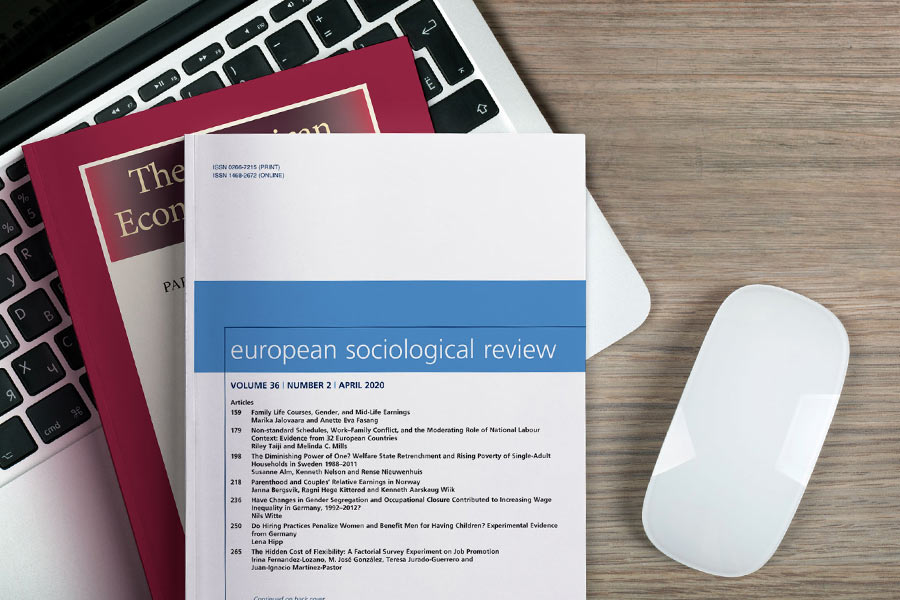Total hits 17.297
-
A Firm-Side Perspective on Parental Leave
Huebener, M., Jessen, J., Kühnle, D. & Oberfichtner, M. (2021): A Firm-Side Perspective on Parental Leave. (IZA discussion paper 14478), Bonn, 51 p.
-
Aus- und Weiterbildung digital – Ist-Stand und Ausblick
Janssen, S.; Kühnert, T. & Ammann, K. (Red.) (2021): Aus- und Weiterbildung digital – Ist-Stand und Ausblick. In: Werkstatt.bpb.de No. 14.06.2021, o. Sz.
-
Homeoffice in der Corona-Krise: Vorbehalte haben abgenommen (Serie "Corona-Krise: Folgen für den Arbeitsmarkt")
Grunau, P. & Haas, G. (2021): Homeoffice in der Corona-Krise: Vorbehalte haben abgenommen (Serie "Corona-Krise: Folgen für den Arbeitsmarkt"). In: IAB-Forum No. 14.06.2021, o. Sz.
-
Einbruch am Arbeitsmarkt ging zulasten von Helfertätigkeiten ( Serie "Corona-Krise: Folgen für den Arbeitsmarkt" )
Kubis, A. & Popp, M. (2021): Einbruch am Arbeitsmarkt ging zulasten von Helfertätigkeiten ( Serie "Corona-Krise: Folgen für den Arbeitsmarkt" ). In: IAB-Forum No. 10.06.2021, o. Sz.
-
Trotz ökonomischer Reformen fehlt eine Strategie in der Wirtschaftspolitik
Gatskova, K. (2021): Trotz ökonomischer Reformen fehlt eine Strategie in der Wirtschaftspolitik. Kommentar. In: Ukraine-Analysen, Vol. 252, No. 07.06.2021, p. 2.
-
Zum Beschäftigungsbedarf in der Pflege Hamburgs bis 2035: Modellrechnungen für die ambulante und stationäre Pflege
Kotte, V. & Stöckmann, A. (2021): Zum Beschäftigungsbedarf in der Pflege Hamburgs bis 2035: Modellrechnungen für die ambulante und stationäre Pflege. (IAB-Regional. Berichte und Analysen aus dem Regionalen Forschungsnetz. IAB Nord 04/2021), Nürnberg, 31 p.
-
Zum Beschäftigungsbedarf in der Pflege Mecklenburg-Vorpommerns bis 2035: Modellrechnungen für die ambulante und stationäre Pflege auf Kreisebene
Kotte, V. & Stöckmann, A. (2021): Zum Beschäftigungsbedarf in der Pflege Mecklenburg-Vorpommerns bis 2035: Modellrechnungen für die ambulante und stationäre Pflege auf Kreisebene. (IAB-Regional. Berichte und Analysen aus dem Regionalen Forschungsnetz. IAB Nord 03/2021), Nürnberg, 40 p.
-
Zum Beschäftigungsbedarf in der Pflege Schleswig-Holsteins bis 2030: Modellrechnungen für die ambulante und stationäre Pflege auf Kreisebene
Kotte, V. & Stöckmann, A. (2021): Zum Beschäftigungsbedarf in der Pflege Schleswig-Holsteins bis 2030: Modellrechnungen für die ambulante und stationäre Pflege auf Kreisebene. (IAB-Regional. Berichte und Analysen aus dem Regionalen Forschungsnetz. IAB Nord 02/2021), Nürnberg, 41 p.
-
Money or meaning? Labor supply responses to work meaning of employed and unemployed individuals
Kesternich, I., Schumacher, H., Siflinger, B. & Schwarz, S. (2021): Money or meaning? Labor supply responses to work meaning of employed and unemployed individuals. In: European Economic Review, Vol. 137, p. 1-26. DOI:10.1016/j.euroecorev.2021.103786
-
Gehen uns die Jobs oder die Fachkräfte aus?
Walwei, U. (2021): Gehen uns die Jobs oder die Fachkräfte aus? Zukunft der Arbeit. In: Lurse Spotlight No. 2, p. 4-9.
-
First Step and Last Resort: One-Euro-Jobs After the Reform and After the Pandemic?
Harrer, T. & Stockinger, B. (2021): First Step and Last Resort: One-Euro-Jobs After the Reform and After the Pandemic? In: The social policy blog No. 07.06.2021.
-
Es gibt keinen Weg zurück in die Zeit vor Corona
Weber, E. (2021): Es gibt keinen Weg zurück in die Zeit vor Corona. Gastbeitrag. In: Wirtschaftswoche No. 04.06.2021, o. Sz.
-
The effects of question, respondent and interviewer characteristics on two types of item nonresponse
Silber, H., Roßmann, J., Gummer, T., Zins, S. & Weyandt, K. (2021): The effects of question, respondent and interviewer characteristics on two types of item nonresponse. In: Journal of the Royal Statistical Society. Series A, Statistics in Society, Vol. 184, No. 3, p. 1052-1069. DOI:10.1111/rssa.12703
-
Einschätzung des IAB zur wirtschaftlichen Lage - Mai 2021
Bauer, A. & Weber, E. (2021): Einschätzung des IAB zur wirtschaftlichen Lage - Mai 2021. In: IAB-Forum No. 01.06.2021 Nürnberg, o. Sz.
-
Sichern wir unsere Selbständigen ab!
Weber, E. (2021): Sichern wir unsere Selbständigen ab! Dauerhafte Regelung bei Arbeitslosigkeit oder Arbeitsausfall dringend notwendig. In: Politik und Kultur No. 6, p. 5.
-
Weiterbildung in Zeiten von Digitalisierung und technologischem Wandel
Janssen, S. (2021): Weiterbildung in Zeiten von Digitalisierung und technologischem Wandel. Gastbeitrag. In: AQ-Blog No. 31.05.2021, o. Sz.
-
Neither Backlash nor Convergence: Dynamics of Intracouple Childcare Division after the First Covid-19 Lockdown and Subsequent Reopening in Germany
Boll, C., Müller, D. & Schüller, S. (2021): Neither Backlash nor Convergence: Dynamics of Intracouple Childcare Division after the First Covid-19 Lockdown and Subsequent Reopening in Germany. (CESifo working paper 9091), München, 37 p.
-
Neither Backlash nor Convergence: Dynamics of Intracouple Childcare Division after the First Covid-19 Lockdown and Subsequent Reopening in Germany
Boll, C., Müller, D. & Schüller, S. (2021): Neither Backlash nor Convergence: Dynamics of Intracouple Childcare Division after the First Covid-19 Lockdown and Subsequent Reopening in Germany. (IZA discussion paper 14375), Bonn, 37 p.
-
Social protection of atypical workers during the Covid-19 crisis
Bruckmeier, K., d'Andria, D. & Konle-Seidl, R. (2021): Social protection of atypical workers during the Covid-19 crisis. In: IAB-Forum No. 28.05.2021 Nürnberg, o. Sz.
-
Die Rückwanderung von Arbeitskräften mildert die demografische Herausforderung vieler ländlicher Regionen nur selten
Stiller, J., Meister, M., Niebuhr, A. & Peters, J. (2021): Die Rückwanderung von Arbeitskräften mildert die demografische Herausforderung vieler ländlicher Regionen nur selten. In: IAB-Forum No. 28.05.2021 Nürnberg, o. Sz.



